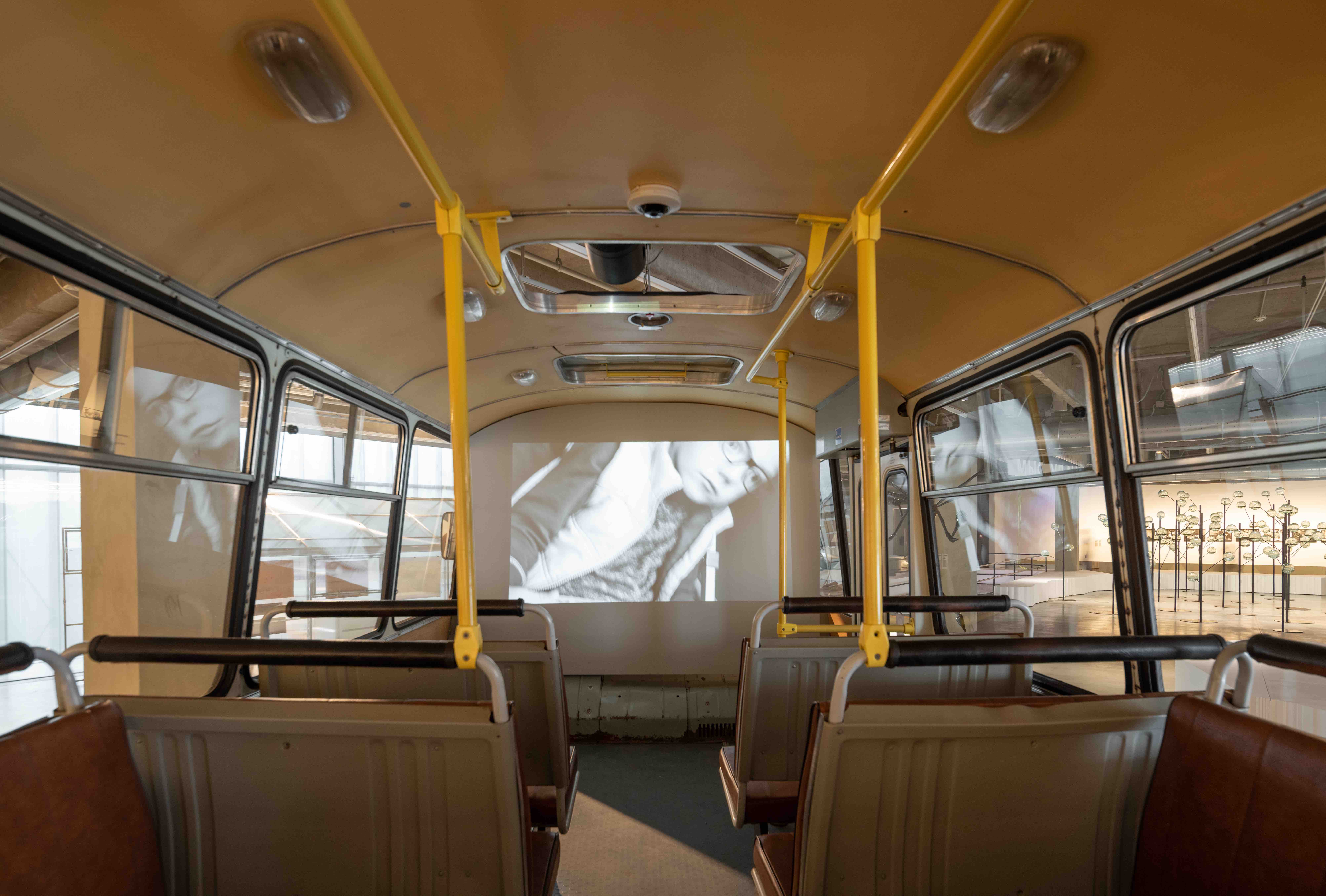
The second edition of the Garage Triennial of Russian Contemporary Art opens to the public today at the Garage Museum in Moscow.
As you might expect for a country as large and diverse as Russia, putting together an overview of contemporary artistic production is a monumental task. The sprawling inaugural show in 2017 was the result of a crack team of six curators scouring 42 cities and towns across 11 time zones for talent.
This time, the curators took a more unorthodox approach. Leaning into the geographical spread that informed the inaugural triennial, curators Valentin Diaconov and Anastasia Mityushina asked the more than 60 artists who took part in 2017 to pick the artists for the second edition. Naturally, a number of artists nominated friends and family, while others chose to auction or raffle off the coveted position.
This was all fine with the curators, who asked only that these connections were made explicit, and that selector and selectee worked together on some dimension of the presentation. The results are being published on the triennial’s website, and include strange collaborations such as Maria Alexandrova’s documentation of a long drive to a remote Siberian village with the grandmother of her nominee, Anna Tereshkina, and Roman Mokrov’s chaotic promise to watch the kids while his nominee, his wife Maria Obukhova, worked on her art.
Garage Triennial of Russian Contemporary Art, “A Beautiful Night for All the People,” installation view, Garage Museum of Contemporary Art, Moscow, 2020. Photo by Yuri Palmin ©Garage Museum of Contemporary Art.
Co-curator Valentin Diaconov tells Artnet News that the resulting eclectic triennial, “A Beautiful Night for All the People,” highlights the important role that relationships play in Russian culture. Diaconov says the triennial’s semi-official slogan is “Corruption and Love.”
“Corruption has been a driving force for Russia since time immemorial, but we often forget that the corrupt politicians and individuals do it all for love—an apartment for grandma, a private jet for a lover,” Diaconov says. “This works fully in this show: you practically buy a place for the closest friend with your enthusiasm. It works beautifully—this level of trust has paid off, and the quality of the work reflects the quality of relationships.”
The offbeat approach to the selection process also reflects the curators’ suspicion towards the idea that there could be one single way to evaluate art in a multinational state with as much cultural and social diversity as Russia. To that point, not all of the artists included in this edition are Russian. The final lineup includes a Japanese artist, Ikuru Kuwajima, and several artists who were born in the USSR but hold passports from Western countries.
“I personally believe that there is no national art anywhere in the world and every artist is a complex amalgam of influences from different communities of religion, online activities, educational background…,” Diaconov says. “So, to define who is a Russian artist is a thankless task.”
“A Beautiful Night For All the People: the 2nd Triennial of Russian Contemporary Art” runs through January 17, 2021, at the Garage Museum of Contemporary Art in Moscow. See more pictures of the exhibition below.
Garage Triennial of Russian Contemporary Art, “A Beautiful Night for All the People,” installation view, Garage Museum of Contemporary Art, Moscow, 2020. Photo by Yuri Palmin ©Garage Museum of Contemporary Art.
Garage Triennial of Russian Contemporary Art, “A Beautiful Night for All the People,” installation view, Garage Museum of Contemporary Art, Moscow, 2020. Photo by Yuri Palmin ©Garage Museum of Contemporary Art.
Gaarage Triennial of Russian Contemporary Art, “A Beautiful Night for All the People,” installation view, Garage Museum of Contemporary Art, Moscow, 2020. Photo by Ivan Erofeev. ©Garage Museum of Contemporary Art.
Gaarage Triennial of Russian Contemporary Art, “A Beautiful Night for All the People,” installation view, Garage Museum of Contemporary Art, Moscow, 2020. Photo by Ivan Erofeev. ©Garage Museum of Contemporary Art.
Gaarage Triennial of Russian Contemporary Art, “A Beautiful Night for All the People,” installation view, Garage Museum of Contemporary Art, Moscow, 2020. Photo by Ivan Erofeev. ©Garage Museum of Contemporary Art.
Gaarage Triennial of Russian Contemporary Art, “A Beautiful Night for All the People,” installation view, Garage Museum of Contemporary Art, Moscow, 2020. Photo by Ivan Erofeev. ©Garage Museum of Contemporary Art.
Gaarage Triennial of Russian Contemporary Art, “A Beautiful Night for All the People,” installation view, Garage Museum of Contemporary Art, Moscow, 2020. Photo by Ivan Erofeev. ©Garage Museum of Contemporary Art.
Gaarage Triennial of Russian Contemporary Art, “A Beautiful Night for All the People,” installation view, Garage Museum of Contemporary Art, Moscow, 2020. Photo by Ivan Erofeev. ©Garage Museum of Contemporary Art.
Gaarage Triennial of Russian Contemporary Art, “A Beautiful Night for All the People,” installation view, Garage Museum of Contemporary Art, Moscow, 2020. Photo by Ivan Erofeev. ©Garage Museum of Contemporary Art.
Svetlana Hollis, Hot and Cold (2020). Production photograph. Photo by Valeria Suchkova. Courtesy of the artist.
Sanya Kantarovsky, Two Suns (2020). Courtesy of the artist and Luhring Augustine Gallery, New York.
::vtol::, Guest (2019). Multimedia installation. Photo: ZARYA Center for Contemporary Art, Vladivostok. Courtesy of the artist.
Anna Tereshkina, Portrait of My Grandmother (2015). Courtesy of the artist.
Leonid Kharlamov, Fragments of the installation Black Obelisk (2020). Courtesy of the artist.